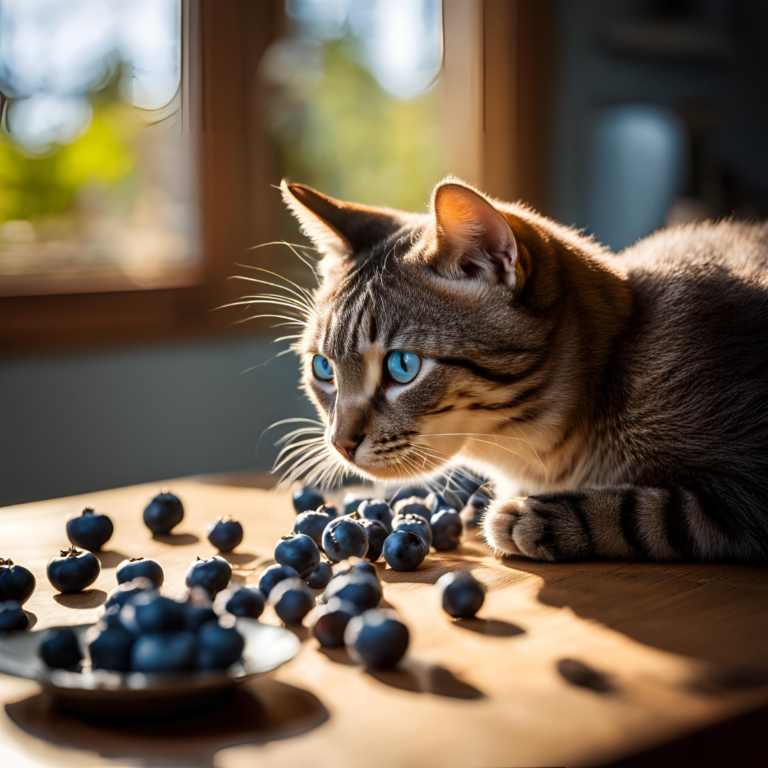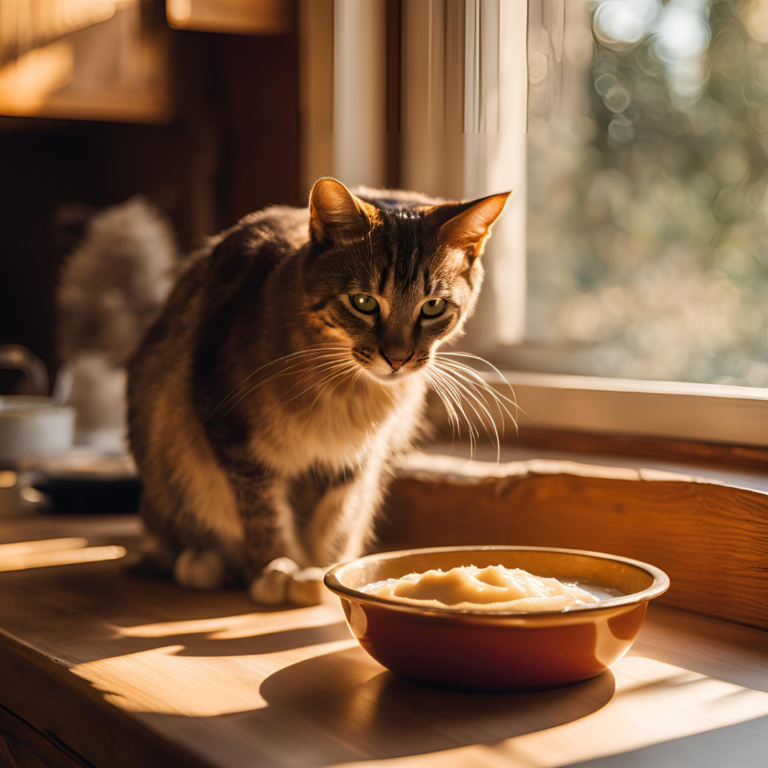Table of Contents
Blueberries are generally small, round in texture, and have a vibrant blue color. Blueberries are a very popular fruit worldwide, especially in the USA, Canada, and European countries. This fruit has a sweet yet slightly tart flavor, although it depends on ripeness. Generally, fully ripe blueberries are sweeter. Blueberries also contain vitamin C, vitamin K, antioxidants, and fiber, which are beneficial for humans.
But the question is, can cats eat blueberries? If you’re a cat parent, this question may have crossed your mind, or it may come up when your cat shows interest in eating blueberries. So, if you want to know more about cats and blueberries, I hope this topic can help you find out.
Can cats eat Blueberries?
The most common question everyone may want to know is: Can cats eat blueberries? The answer is yes, blueberries are safe for cats. They are non-toxic for cats, so if you’re thinking of giving blueberries to your cat, you can. But remember that blueberries shouldn’t be part of a cat’s regular diet, so it’s better to offer them in moderation as an occasional treat.
Nutritional Benefits of Blueberries for Cats
Although blueberries are safe and provide nutrients to humans, they can also provide some nutrition to cats if offered in moderation. Let’s see what types of benefits cats can get:
- Blueberries contain fiber, which helps with digestion in cats.
- Blueberries have water, which can help hydrate cats.
- Blueberries are a low-calorie fruit, so as a treat, they can be a good idea for cats.
- Blueberries contain antioxidants, which can be good for overall cat health and help combat oxidative stress.
- Blueberries are rich in vitamins A and K, contributing to a healthy immune system and proper blood clotting in cats.
Note: Although cats can benefit from blueberries, they should be given in moderation. Offering too many blueberries may cause more harm than good.
Safe Preparation Methods of Blueberries for Cats
If you want to give blueberries to your cat safely, follow a few simple steps. It’s very easy.
First, choose fresh and ripe blueberries, then wash them thoroughly with water to remove any pesticides or dirt. After that, offer small amounts to your cat. You can cut the blueberries into small pieces or mash them to make it easier for your cat to eat.
Note: Some cats may have trouble with blueberries, especially if it’s their first time. After giving blueberries to your cat, monitor them. If you notice any signs like vomiting or an upset stomach, consult a vet.

Suitable Quantities of Blueberries for Cats
If you’re thinking of giving blueberries to your adorable cat, it’s safe, and many vets also recommend this. However, they should be offered in moderation as an occasional treat.
Cats are obligate carnivores, meaning they get necessary nutrition from animal-based protein foods. If cats eat blueberries regularly or in large amounts, it can cause digestive issues. Generally, blueberries should be offered to cats a few times a week (1-2 small and ripe pieces), which is suitable for them.
Potential Risks of Blueberries
Sometimes blueberries can carry health risks if not used properly for cats. Let’s look at these risks:
- Blueberries should be offered in moderation. If given in large amounts, cats can experience digestive issues such as vomiting or an upset stomach.
- Whole blueberries can pose a choking hazard, especially for kittens, so it’s better to cut or mash them.
- In rare cases, some cats may be allergic to blueberries, which could result in itchy skin or other problems. Although this is rare, there is a small chance.
- Giving blueberries daily or in large amounts can increase a cat’s weight, which is not good for their health.
Note: Blueberries can be safe for cats, but they may also create health risks. Before offering blueberries, be aware of these risks.

Creative Treats for Cats
If you want to make creative blueberry treats for your cat, follow these steps:
- You can make a blueberry smoothie for your cat. Take some blueberries and add water, then blend. Serve this smoothie in your cat’s regular bowl, but in small amounts.
Dos and Don’ts
Dos:
- Before offering blueberries, they should be washed well to remove pesticides or dirt.
- Offer blueberries in moderation (1 or 2 pieces) as an occasional treat.
- Cut blueberries into small pieces or mash them to make it easier for cats to eat.
- Monitor your cat after giving blueberries and watch for any digestive issues.
Don’ts:
- Avoid offering large amounts of blueberries.
- Avoid giving flavored blueberries.
- Don’t give whole, uncut blueberries to kittens, as they may pose a choking hazard.
Conclusion
In conclusion, we know that blueberries are safe for cats. However, cats are obligate carnivores, so this fruit shouldn’t be part of their regular diet. Offer blueberries as an occasional treat.
Some cats may have trouble with blueberries, so if you think your cat has a problem or eats large amounts of blueberries, monitor them for any signs and consult a vet.
Note: Before making any changes to your cat’s diet, such as introducing blueberries or other fruits, it’s better to first consult a vet.
FAQ’s
Can cats have blueberries every day?
No, blueberries shouldn’t be part of their regular diet. They should be given in moderation as an occasional treat.
Are blueberries safe for cats?
Yes, blueberries are safe for cats, but giving them large amounts can cause digestive issues, so don’t do that.
What are the benefits of blueberries for cats?
Blueberries contain fiber, water, antioxidants, and nutrients that can benefit cats by aiding digestion and overall health.
How should I serve blueberries to my cat?
Take fresh and ripe blueberries, wash them well, then cut into small pieces or mash them before offering small amounts to your cat.
Can cats be allergic to blueberries?
There’s a small chance some cats may be allergic to blueberries, though it’s rare.
What should I do if my cat eats too many blueberries?
If your cat eats too many blueberries, discontinue giving them and monitor for any signs. If necessary, consult a vet.
Can kittens eat blueberries?
Yes, but they should be offered in very small amounts.
Do blueberries have any calories for cats?
Yes, blueberries contain calories, but they are low in calories, making them a good treat option for cats.
Are frozen blueberries safe for cats?
Yes, frozen blueberries can be safe, but make sure they aren’t mixed with sugar or preservatives before offering them.
Can I mix blueberries with my cat's food?
Yes, you can mix blueberries with your cat’s food, but in small amounts.



